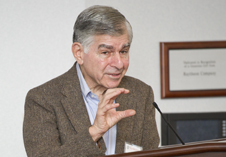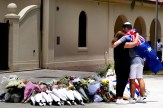Assessing the 2012 presidential election

The 2012 presidential election may be about a year away, but that hasn’t stopped politicians and academics from analyzing the race from a scholarly perspective.
Speaking at a conference entitled “The Presidential Election of 2012: Candidates, Issues and Parties,” held in Raytheon Amphitheater last Thursday, Northeastern University political science professor William Crotty said, “The nomination process begins in less than two months. This is it. We’re here.”
Obama’s election was supposed to be a “progressive realignment of national policies,” added Crotty, the Thomas P. O’Neill Chair in Public Life. “Well, none of that happened.”
The conference — cosponsored by the O’Neill Chair and the Department of Political Science — included an early morning panel discussion on policy-making in the Obama administration, a lecture on the impact of the Occupy Wall Street movement on the 2012 race and an afternoon panel discussion on politics and the Obama presidency, which featured a lecture by Distinguished Professor of Political Science Michael Dukakis.
He called his experiences as the 1988 Democratic nominee for president both humbling and exhausting.
“It’s an extraordinary country with extraordinary people,” Dukakis recalled. “And the worst thing about not being able to succeed is disappointing all those folks who supported you and believed in you.”
The primary issues in the 2012 campaign are still emerging, noted Scott L. McLean, chair of the philosophy and political science department at Quinnipiac University, a highly-regarded center for political polling.
“I largely see the 2012 election as a campaign to define what the issues are, and that is still changing,” McLean said. “This summer, the issue was debt and the deficit, and now this fall we’re seeing the issue is shifting toward income inequality.”
Crotty said a major factor in the upcoming campaign would be that Democratic voters are far less supportive of President Obama than they were of candidate Obama. Republican voters, he noted, may be more eager to vote against Obama than for the eventual GOP nominee, who conference attendees agreed would be former Massachusetts governor Mitt Romney.
“Democratic voters are just not enthusiastic about this election,” Crotty said. “Jobs will be an issue, but clearly that’s not going to work to [Obama’s] benefit.”
The importance of holding conferences to discuss hot-button political issues cannot be understated, noted Mary Loeffelholz, Northeastern’s vice provost for academic affairs.
“We’ve seen rulers toppled in countries that weren’t even on our agenda last time, plus growing unsustainability and issues of equity that have prompted wonder about our future,” she said. “Well some of us have stopped wondering and gone on to occupy Wall Street or to spread the Tea Party’s message through the nomination process. These are all important discussions.”





